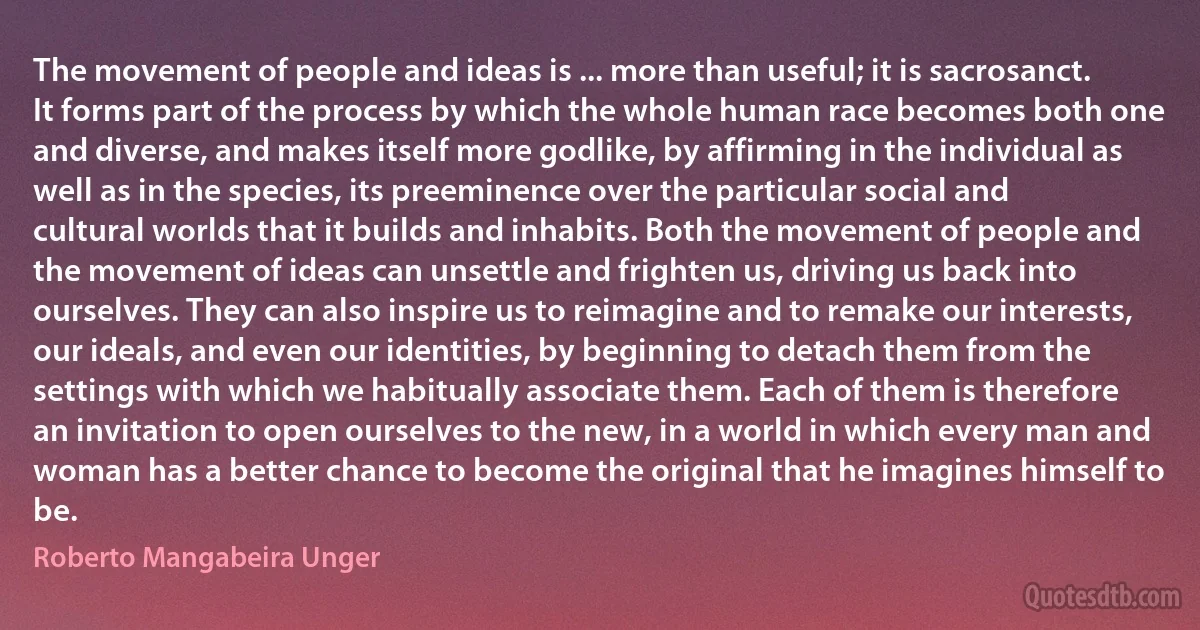
The movement of people and ideas is ... more than useful; it is sacrosanct. It forms part of the process by which the whole human race becomes both one and diverse, and makes itself more godlike, by affirming in the individual as well as in the species, its preeminence over the particular social and cultural worlds that it builds and inhabits. Both the movement of people and the movement of ideas can unsettle and frighten us, driving us back into ourselves. They can also inspire us to reimagine and to remake our interests, our ideals, and even our identities, by beginning to detach them from the settings with which we habitually associate them. Each of them is therefore an invitation to open ourselves to the new, in a world in which every man and woman has a better chance to become the original that he imagines himself to be.
Roberto Mangabeira UngerRelated topics
affirming beginning chance human imago man open people preeminence race remake well woman worldRelated quotes
If Christ were to walk in this world today, do you know what would happen to Him? He would be placed in a mental institution and given psycho-therapy, just as would His Saints. The world would crucify Him today just as it did 2000 years ago, for the world has not learned a thing, except more devious forms of hypocrisy. And what would happen if, in one of my classes at the university, I would one day tell my students that all the learning of this world is of no importance beside the duty of worshipping God, accepting the God-man who died for our sins, and preparing for the life of the world to come? They would probably laugh at me, and the university officials, if they found out, would fire me-for it is against the law to preach the Truth in our universities. We say that we live in a Christian society, but we do not: we live in a society.

Seraphim Rose
Our ultimate task is to find interpretative procedures that will uncover each bias and discredit its claims to universality. When this is done the eighteenth century can be formally closed and a new era that has been here a long time can be officially recognised. The individual human being, stripped of his humanity, is of no use as a conceptual base from which to make a picture of human society. No human exists except steeped in the culture of his time and place. The falsely abstracted individual has been sadly misleading to Western political thought. But now we can start again at a point where major streams of thought converge, at the other end, at the making of culture. Cultural analysis sees the whole tapestry as a whole, the picture and the weaving process, before attending to the individual threads.

Mary Douglas
Certain it is, that any supposed obstructions, concerning the quality or temperature of any or every one of those worlds, could not have been any bar in the way of God Almighty, with regard to his replenishing his universal creation with moral agents. The unlimited perfection of God could perfectly well adapt every part of his creation to the design of whatever rank or species of constituted beings, his Godlike wisdom and goodness saw fit to impart existence to; so that as there is no deficiency of absolute perfection in God, it is rationally demonstrative that the immense creation is replenished with rational agents, and that it has been eternally so, and that the display of divine goodness must have been as perfect and complete, in the antecedent, as it is possible to be in the subsequent eternity.

Ethan Allen
I see those pretended politicians who place all their subtlety, and who think they serve their country best, in circumventing those with whom they treat, interpreting the conditions of a treaty in such a manner, that all the advantage results to their own country. Far from blushing at conduct so contrary to equity, to right, and to national honesty, they boast of their dexterity, and pretend that they deserve the name of great negociators. How long shall public men boast of conduct which would disgrace a private individual? ...Shall powerful states abandon openly that which is honest, for that which may appear useful? It often happens for the happiness of the human race, that this pretended utility is fatal to the powers who follow it, and that, even among sovereigns, candour and right are found to be the safest policy.

Henry Temple, 3rd Viscount Palmerston
In 1946, a Macy Foundation interdisciplinary conference was organized to use the model provided by "feedback systems," honorifically referred to in earlier conferences as "teleological mechanisms," and later as "cybernetics," with the expectation that this model would provide a group of sciences with useful mathematical tools and, simultaneously, would serve as a form of cross-disciplinary communication. Out of the deliberations of this group came a whole series of fruitful developments of a very high order. Kurt Lewin (who died in 1947) took away from the first meeting the term "feedback". He suggested ways in which group processes, which he and his students were studying in a highly disciplined, rigorous way, could be improved by a "feedback process," as when, for example, a group was periodically given a report on the success or failure of its particular operations.

Margaret Mead
